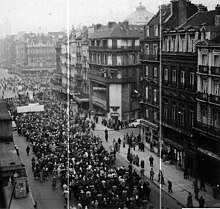Belgian general strike of 1960–1961
You can help expand this article with text translated from the corresponding article in French. Click [show] for important translation instructions.
|

The general strike of 1960–1961 (French: Grève générale de 1960–1961), known popularly in Wallonia as the Strike of the Century (Grève du Siècle), was a major series of strikes in Belgium which began on 14 December 1960 and lasted approximately six weeks.
The general strike was instigated by the militant trade union, the
The strike is considered a key moment for the Walloon Movement and an influence on the formation of Walloon identity. It led to the foundation of a new ideology of Renardism which linked Walloon nationalism with syndicalism. The strike also led to the creation of the pro-federalist Walloon Popular Movement (Mouvement Populaire Wallon, MPW) in 1961 and an increasing polarization between Flemish and Walloons which culminated, from the late 1960s, in the "Linguistic Wars" and, ultimately, in Belgium's gradual transformation into a federal state.
The 1983 film Winter 1960 is based on the strike. The strike was the subject of the documentary film Lorsque le bateau de Léon M. descendit la Meuse pour la première fois (1979) by the Dardenne brothers.
See also
- Belgian general strikes
- Misère au Borinage (1933)
- André Renard
- Split of the Catholic University of Leuven
- Congo Crisis (1960-65)
References
- ISBN 978-90-5487-517-8.
Further reading
- Neuville, J.; Yerna, J. (1990). Le Choc de l'Hiver '60-'61: Les Grèves contre la Loi Unique (in French). Brussels. ISBN 9782873110024.)
{{cite book}}: CS1 maint: location missing publisher (link - Francq, Bernard; Courtois, Luc; Tilly, Pierre (2011). La mémoire de la grande grève : de l'hiver 1960-1961 en Belgique. Brussels: Le Cri. ISBN 9782871065876.
- Chaumont, Maurice (2015). "Grèves, syndicalisme et attitudes ouvrières. Les grèves belges de décembre 1960 - janvier 1961". SociologieS (Online Edition) (in French). ISSN 1992-2655.
- Bolle, Francine (2013). "Les interprétations de la grande grève de l'hiver 1960-1961 en Belgique dans les milieux révolutionnaires". Dissidences (in French) (6). ISSN 2118-6057.
- Meynen, Alain (1978). "De grote werkstaking 1960-1961. Een inleidend overzicht van de ekonomische en socio-politieke achtergronden van de grote werkstaking 1960-1961". Belgisch Tijdschrift voor Nieuwste Geschiedenis (in Dutch). 3–4: 481–515. Retrieved 11 August 2023.
External links
- Belgian general strike diary of Maurice Brinton at Libcom.org
- The Belgian General Strike by Tony Cliff at Marxist Internet Archive
- Grèves de 60: ce passé qui nous divise encore at Le Vif
